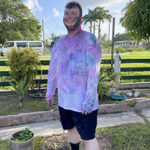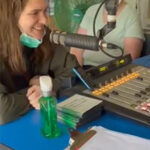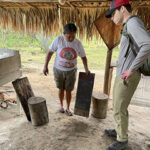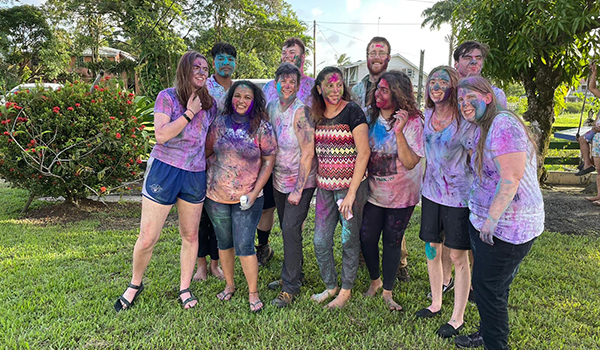IU East students rave about study trip to Guyana in upcoming virtual presentation
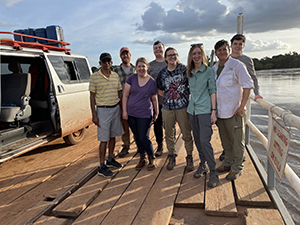
IU East students in the Guyana Shield and Amazon Rainforest traveled to study abroad this spring. The group crossed by pontoon to Essequibo to Iwokrama. (From left to right, front row) Wazir Mohamed, professor of sociology; Samantha Frame; Mya Whaley; Liberty Dickey, a student at IU Southeast; Megan Rockwell; (back row) Aaron Comstock, assistant professor of anthropology; Reggie Reuss; and Noah Fox.
A pioneering trip to Guyana this March provided much more than study abroad for a class on sustainability at Indiana University East.
Students who traveled on the Guyana Shield and Amazon Rainforest study abroad trip will give a virtual presentation on their personal projects and discuss their experiences on the trip from 3-4:30 p.m. on Friday, April 22, available to watch on Zoom or follow the event live on the IU East Facebook page.
The study abroad trip is the first for IU East since the COVID-19 pandemic began in 2020, with three more planned trips coming up this spring and summer.
It gave the students up-close looks into a rainforest and cultural immersions into a welcoming, diverse population.
It gave them hands-on experiences that ranged from enduring bumpy bus rides to crossing narrow bridges, from taking mountain hikes to making bows and arrows, from sharing in family meals to taking part in a Hindu festival.
They viewed colorful birds and spider monkeys. They visited museums and educational institutes. They talked with government officials and experts in a variety of fields.
Simply put, the students had a great time. The 10-day trip gave them personal and educational memories that will last a lifetime.
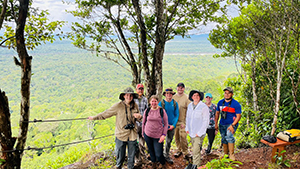
The group enjoys the view after hiking to the top of Turtle Mountain in Guyana. Learn more about the trip during the student’s virtual presentation from 3-4:30 p.m. on Friday, April 22, via Zoom.
“There were so many highlights to the trip, it was hard to count,” said Noah Fox, who will graduate in May with a major in informatics and a minor in anthropology. “My area of interest was discovering the people of Guyana through their foods. They have six different cultures. It’s very diverse.” Fox is from Richmond and a Lingle Scholar.
The trip opened eyes, hearts and minds to a friendly country with many distinct cultures – and to the need for sustainability in such a wonderful place. “There was so much to marvel, and also so much to learn,” said Mya Whaley, a senior from Fishers, Indiana, who is majoring in Spanish. “Meeting with people from different backgrounds also opened my eyes to beautiful ways of living and problem-solving that I would not have known without this trip.”
Megan Rockwell, a senior sociology major from Charleston, South Carolina, said the trip helped to solidify that she is heading in the right direction for a future to promote and conserve the environment. One of the highlights for Rockwell on the trip was a boat ride on the Essequibo River for the hike up Turtle Mountain. Not only did the river offer a scenic view, it offered an up-close look at the wildlife.
“The (boat) drivers knew the area like we know our back roads,” Rockwell said. “The rainforest is an amazing place filled with abundant biodiversity. The Screaming Piha (a small brown bird) was there greeting us along every turn with their loud whistle. Micah, lead ranger for Iwokrama and Toshao of his village, was a great guide explaining things and answering every question.”
Senior Reggie Reuss is an informatics major from Brookville, Indiana. He said the memories from the trip will last a lifetime. The hike to Turtle Mountain is also a favorite.
“The memories that will stick with me the most are bonding with my peers and professors, while experiencing the beautiful landscape and interacting with the locals. For example, hiking up Turtle Mountain while sharing deep conversations with my peers and mentors or me learning about the indigenous lifestyle and shooting a bow and arrow for the first time.”
Wazir Mohamed, professor of sociology, designed the study abroad class to the Rainforest and led the “pioneering” trip to Guyana. He has an intimate knowledge of the country of about 740,000 that sits on the north mainland of South America. He was born and raised in a rural village there and worked as a rice farmer before going to college.
Mohamed started teaching at IU East in 2008. He retains close ties with family, friends and fellow educators in Guyana and regularly goes back.
“The students were able to immerse themselves in how they live there,” Mohamed said. “It was excellent.”
His connection to the country was a major reason for that “excellence,” Fox said. “Wazir has a feel for that culture. He is well-accustomed to it. He knew what he was doing.”
Aaron Comstock, assistant professor of anthropology, co-taught the course and led the trip.
Mohamed has hopes that the class and study abroad trip will become a regular one at IU East.
“This was a pioneering trip,” he said. “Most likely, we are going to make this permanent.”
The reactions of the students would appear to make that a well-received idea.
Fox initially became acquainted with the trip by seeing a flyer around campus last September and learned more about it from a former professor in his minor of anthropology.
Each of the study abroad students took Mohamed’s class on the Sustainability of the Rainforest.
The diversity of the class subject was matched in part by the diversity of the student backgrounds. They come from four different disciplines – anthropology, biology, sociology and information technology, Mohamed said.
“They took the class for different purposes. My main goal was to allow them to find something from this trip that will expand their horizons academically, to allow them to grow and blossom. I think we achieved a lot of that on this trip.”
He also stressed that the class and trip were designed to help students “understand the importance of rainforests to the future of humanity (and) sustainability with nature.”
Mohamed plotted out a busy schedule of activities during the trip that took place from March 11-19. The trip had its complications, such as an initial travel disruption, long, harrowing bus rides on muddy roads and COVID testing. “One student couldn’t make the connection to get the flight to Georgetown,” Mohamed explained.
That turned visits into the rainforest from five days to four, but offered an opportunity to visit creeks on the coastline, where students were able to “see a Canje pheasant (the national bird) in its natural environment.”
They also shared their experience with interviews at the local radio station, Radio Paiwomak 97.1 FM. The station is the first indigenous community radio operating in Guyana and keeps tradition alive with daily broadcasts in the Amerindian Dialect.
Some of those activities included:
Day 2 – Welcome by families and a trip up the Mahaica River.
Day 3 and 7 – Road trips (often harrowing) to the rainforest and to the city.
Day 4 – Tour of milling facilities, Turtle Mountain hike, boat up the Essequibo River.
Day 5 – Visit canopy walkway, radio station and Bina Hill Institute.
Day 6 – Cultural Immersion in Surama, including cassava cultivation and processing and learning to cook Indigenous meals. Visit with Guyana’s former Vice President Sidney Allicock.
Day 8 – Visit to Buxton Museum, cultural Immersion in East Indian Village, Holi Festival and meet the University of Guyana vice chancellor.
Each student was allotted time to focus on a particular area of study.
Fox studied food and diets and a concept called cultural hybridity – how food gets to the plate in Guyana. He took photos of every meal.
“I would ask cooks about the origins of the food, the ingredients and the cultural relations to that,” Fox said.
Guyana is made up of many cultures, including West Indian, Indigenous and Caribbean.
Fox particularly enjoyed a chicken curry that was served with roti, like a bread that rolled out flat and fried on a griddle. “That was one of my favorite things I had while I was there,” Fox said.
Reuss said his personal project was focused on technology and a comparison to the United States.
“I met several mentors in the technology field that enlightened me on the progress and norm in the country,” Reuss said. “For example, although Guyana is one of the poorest countries in the Western Hemisphere, their technological infrastructure is there and still expanding. They are not close to as far behind as some would think with labels that come with Third World countries. Most people in the city … had smartphones and there was free fiber optic government wi-fi provided at certain buildings.”
Reuss found the trip refined his career further.
“This aided in learning about different technologies, but especially implementation,” Reuss said. “Observing the conflict of implementation plans, the politics surrounding it, education on new technology and implementing technology in poorer communities, all have greatly benefitted my career.”
Whaley’s project focused on the region’s water systems and how humans are impacting them.
“After graduating this spring I am working toward a master’s degree in Marine Science and Climate Change,” she said. “The bodies of water that we were able to see and learn about tied in perfectly to my project, and speaking with the scientists and natives to the area was a game changer for my understanding of this topic. Something that I noticed during my time in Guyana is that, even though the country is in a lot of ways a role model for sustainability, it is not free from the impacts of climate change. We saw this a bit for ourselves as we were accompanied by substantial amounts of rainfall during what is usually considered the dry season.”
Rockwell’s project was related to environmental sociology and “involved understanding their local ecotourism. As a group, we were able to enjoy a few of the interior tourist spots that were executed and maintained by the Amerindian villagers to benefit the community as a whole. We spent time talking with the creator and managers of Iwokrama Research Centre, Bina Hill Institute and the North Rupununi District Development Board, and Surama Ecolodge.”
The students shared some of their favorite memories from the trip.
Reggie Reuss, senior informatics major, Brookville, Indiana
“Food is a notable memory. The fruit and juice is so fresh with no preservatives or anything and it is leagues better than any fruit I have had here in the Midwest. My favorite memory was zooming down the Essequibo River, while being soaked in the pouring rain and looking back and forth enjoying the view,” Reuss said.
Mya Whaley, senior Spanish major, Fishers, Indiana
“The breathtaking scenery and the hospitality of everyone that we met is what stands out to me the most about the experiences that we had in Guyana. From the rainforest to the savannahs to different areas of Georgetown, there was so much to marvel, and also so much to learn.”
Megan Rockwell, senior sociology major, Charleston, South Carolina
“What stands out most for me about my experience in Guyana is the hospitality and the different pace of life. Everyone was very welcoming and wanted to share their life, their experiences, and how they moved through the world. The Amerindians of the interior may have a hard existence but they appreciate the Earth and all the land has to offer. They appreciate life and the environment and want to protect both.”
Noah Fox, senior informatics major with a minor in anthropology, Richmond, Indiana
“I learned a lot about the cultures, the Guyanese and the Indigenous people. One important part of Guyana culture is you don’t leave their homes without a meal. They greet you with open arms and kindness.
My favorite activity was hiking up the trail to Turtle Mountain. There’s an amazing view of undisturbed rainforest that has different species of animals and plants. We got to see some spider monkeys from a distance. The whole hike was really, really cool. It was almost like you were a monkey swinging in trees.”
Comstock said the 2022 Sociology/Anthropology study abroad trip to Guyana highlights the importance of multicultural experiences in the inclusive and comprehensive education stressed at IU East.
“Our students had the unique opportunity to participate in cultural experiences that exceed what they might otherwise see in their lifetime, engage with people from a variety of cultural and economic backgrounds, and research important anthropological and sociological topics,” Comstock said. “All of this was embedded within a context of ecology and sustainability education that is critical in the modern world.As an anthropologist, seeing students navigate multiethnic experiences, eat a wide variety of new foods, and grow as scholars and friends was incredibly enriching. The experiences that our students had in Guyana will stay with them for the rest of their lives. The fact that we offer this course is a credit to our university and it is an opportunity that future students will undoubtedly enjoy.”


